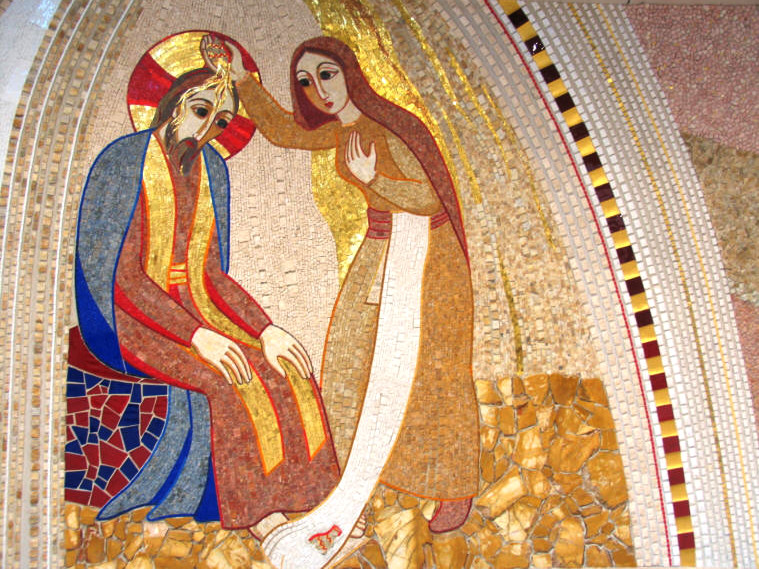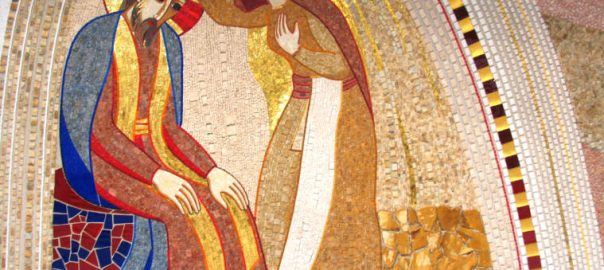Notes for a sermon for Palm Sunday, March 2018.

“While Jesus was in Bethany in the home of Simon the Leper, a woman came to him with an alabaster jar of very expensive perfume, which she poured on his head as he was reclining at the table. When the disciples saw this, they were indignant. “Why this waste?” they asked. “This perfume could have been sold at a high price and the money given to the poor.” Aware of this, Jesus said to them, “Why are you bothering this woman? She has done a beautiful thing to me. The poor you will always have with you, but you will not always have me. When she poured this perfume on my body, she did it to prepare me for burial. Truly I tell you, wherever this gospel is preached throughout the world, what she has done will also be told, in memory of her.” (Matt. 26:6-16)
In the story of Jesus’ anointment by the woman at Bethany we have a peculiar measuring stick for whether the gospel is being preached or not: Wherever the gospel is preached, says Jesus, the story of this woman will also be told! I think the story is best told, though, with the immediate context in mind.
When Jesus had entered the city Palm Sunday riding on a donkey the crowd was hyped: ”Hosanna to the Son of David! Blessed is he who comes in the name of the Lord! Hosanna in the highest!” (Matt. 21:9). Jesus was being hailed as the coming Messiah that was to bring back Israel’s lost greatness. In the eyes of the people he was a political leader, who was about to become king, fight the Romans and rebuild David’s kingdom.
Not long after Jesus’ entrance in Jerusalem he went to Bethany to dine in the house of a man called Simon the Leper. It was while seated there with his disciples, that suddenly a women came to Jesus, and poured expensive perfume over his head.
The disciples obviously saw this as quite inappropriate. Couldn’t this precious oil have been used for more reasonable purposes? Think of all the money that could have been released for the poor by selling it! And here she goes wasting it all!
But Jesus welcomes the woman and uses her devotion as a symbol: By anointing him with oil the woman has anointed Jesus to his coming death. Now, according to John the perfume was made from spikenard oil, a kind of oil used for anointing the dead on the on hand, but also for anointing kings on the other.
The point could be made here, I think, that when the woman anoints Jesus, she doesn’t just anoint him for his death, but also for his coming kingship. Or rather, these are two sides of the same coin. It is exactly through his death that Jesus becomes king. This is why he entered Jerusalem – not to become a worldly king or political leader like David, but to die on the cross.
This is what his disciples does not understand. Jesus’ disciples seem to have been more concerned about worldly justice, than with the righteousness of the kingdom of God. Often this is exactly what we do as well, even if we come to different conclusions. From a typical ”right-wing” standpoint we could argue that the woman, having the property rights over the perfume, had the right to do as she wanted with it. Or we could argue from a ”left-wing” standpoint, like the disciples, that the oil should have been sold and the money given to the poor.
But Jesus doesn’t care too much about our worldly ideas of justice. Our ideas of justice must die on the cross with Jesus, just as the crowd’s worldly ideas of the Messiah and his kingdom must go. But just as Jesus does not stay in the grave, our concepts of justice are not to stay dead either. Rather they are to be transformed by the kingdom of God.
We are to understand that in the light of Jesus’ resurrection, true justice and righteousness is something infinitely greater and wider and deeper, than anything we can imagine with our narrow concepts of justice. Jesus is himself the righteousness of God!
This is what the story of the woman with alabaster jar reminds us: That the kingdom of God explodes all our narrow concerns and ideas of justice. Instead we are to look to Jesus as the woman did. When we do that we are ready to help the poor, who are always with us in the kingdom. When we loose our concepts of justice we gain the possibility of true solidarity as we realize that we are one with the poor. The justice of the kingdom of God does not exclude worldly justice, but includes it and brings it all into a much wider perspective.
”Blessed is he who comes in the name of the Lord! Hosanna in the highest!” (Matt. 21:9)
